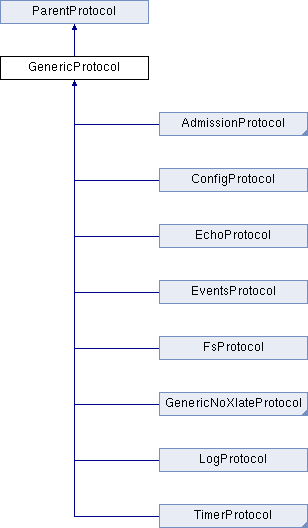Public Member Functions |
| unsigned | call_server (Utcb &utcb, bool drop_frame) |
| | Call the server in a loop to resolve all faults.
|
| unsigned | call_server_drop (Utcb &utcb) |
| unsigned | call_server_keep (Utcb &utcb) |
| template<class T > |
| void | destroy (Utcb &utcb, unsigned portal_num, T *obj) |
| | Destroy the object.
|
| void | close (Utcb &utcb, unsigned portal_num, bool revoke_lock=true, bool _release_pseudonym=true) |
| | Close the session to the parent.
|
| unsigned | get_notify_sm () |
| Utcb & | init_frame (Utcb &utcb, unsigned op) |
| | GenericProtocol (const char *service, unsigned instance, unsigned cap_base, bool blocking, unsigned session_base=~0u) |
| | static_assert ((CAP_PT_PERCPU+Config::MAX_CPUS)< (1U<< Config::CAP_RESERVED_ORDER),"Capability Space misconfiguration.") |
Static Public Member Functions |
| static Utcb & | init_frame_noid (Utcb &utcb, unsigned op) |
| static Utcb & | init_frame (Utcb &utcb, unsigned op, unsigned id) |
| static unsigned | call (Utcb &utcb, unsigned cap_base, bool drop_frame, bool percpu=true) |
| | Low-level systemcall.
|
| static unsigned | get_pseudonym (Utcb &utcb, const char *service, unsigned instance, unsigned cap_pseudonym, unsigned parent_id=CAP_PARENT_ID) |
| static unsigned | release_pseudonym (Utcb &utcb, unsigned cap_pseudonym) |
| static unsigned | get_portal (Utcb &utcb, unsigned cap_pseudonym, unsigned cap_portal, bool blocking, char const *service_name=0) |
| | Ask parent to get the portal to talk to the service.
|
| static unsigned | register_service (Utcb &utcb, const char *service, unsigned cpu, unsigned pt, unsigned cap_service, char *revoke_mem=0) |
| static unsigned | unregister_service (Utcb &utcb, unsigned cap_service) |
| static unsigned | get_quota (Utcb &utcb, unsigned cap_client_pseudonym, const char *name, long invalue, long *outvalue=0) |
| static unsigned | set_singleton (Utcb &utcb, unsigned cap_client_pseudonym, unsigned cap_local_session) |
| static unsigned | check_singleton (Utcb &utcb, unsigned cap_client_pseudonym, unsigned &cap_local_session, Crd crd=Crd(0, 31, DESC_CAP_ALL)) |
| | Services can use check_singleton() in conjunction with set_singleton() to enforce a one-session-per-client policy.
|
| static unsigned | kill (Utcb &utcb, unsigned cap_client_pseudonym, unsigned service_cap=0) |
| static unsigned | signal (Utcb &utcb, unsigned value) |
| | Signals an (arbitrary) event to the parent.
|
Generic protocol handling, hides the parent protocol handling.
Specific protocols will be inherited from it. This is meant to be used only by clients.
Features: session-open, parent-open, request-portal, optional blocking Missing: restrict-quota

 Public Types inherited from ParentProtocol
Public Types inherited from ParentProtocol Public Member Functions inherited from ParentProtocol
Public Member Functions inherited from ParentProtocol Static Public Member Functions inherited from ParentProtocol
Static Public Member Functions inherited from ParentProtocol